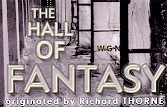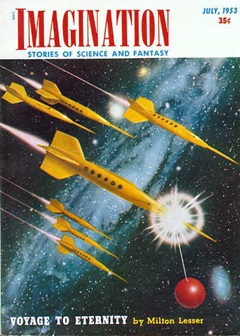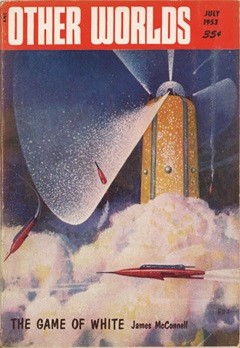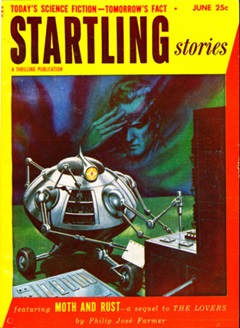
 Hall of Fantasy aired “The Treasure of Kublai Khan” on July 20, 1953. It is the 15th episode of Hall of Fantasy we have run since the first in October of 2011. It is only the 4th since September of 2017, with the one previous to this episode coming in June of 2021. Therefore, a recap is in order for newcomers to the program.
Hall of Fantasy aired “The Treasure of Kublai Khan” on July 20, 1953. It is the 15th episode of Hall of Fantasy we have run since the first in October of 2011. It is only the 4th since September of 2017, with the one previous to this episode coming in June of 2021. Therefore, a recap is in order for newcomers to the program.
Hall of Fantasy (1946-47 from station KALL in Utah, and 1949-53 from station WGN in Chicago) aired an estimated 200+ scripts or (combined) broadcasts, yet only between 40-45 are thought to still exist (though estimates vary), which is a shame, for creator, writer, director, and sometimes Hall of Fantasy actor Richard Thorne (1925-2007*, photo top right) was an extremely talented individual, and those episodes still surviving are held in high regard by OTR fans.
The first two years were broadcast from Utah (on those stations on the Intermountain Network) and the show concentrated on straight mysteries or murder plots, but when the show ended up in Chicago and was subsequently revived due to a fortunate turn of fate, it shifted focus to the supernatural or straight horror story format for which it became famous, all but adaptations of the classics being written by Thorne. The show went national on the syndicated Mutual Network in 1952.
[*I would like to express my thanks to Old Time Radio historian Karl Schadow for supplying the birth and death dates for Richard Thorne after my own search came up empty.]
The network would run rebroadcasts from late 1953 into 1954, though because of the shoddiness of research and/or outright collusion on the part of a few commercial sellers attempting to fob off a number of rebroadcasts as originals to aid their sales, it is quite possible that many of their shows are broadcasts from years earlier, with no foreseeable hope of pinning down their first airings due to the incomplete and/or unverifiable historical record.
“The Treasure of Kublai Khan” begins innocently enough, in friendly conversation with the Iranian Adbul Hussein closing out a visit to his American friends before his return to his homeland. He is beseeched in the time left to him to tell the legendary story of Kublai Khan’s treasure, famed grandson of the great ruler Genghis Khan, and the immense treasure he had carefully buried some 7 centuries past but which no one to this day has been able to locate. Those who have tried, so the legend goes, have never been seen again and are rumored to have met their end at the hand of the Guardian of the Treasure. Their interest piqued, Hussein’s friends prevail upon him to offer his opinion as to the verity of the story, for it seems but just the sort of made up tale fashioned to tease those who would take it as a prima facie truth. At this point Hussein pulls out and carefully unfolds a map, one purported to hold the true location of Khan’s lost treasure. Soon enough Hussein’s friends have lost their reason in thrall to their now overpowering curiosity. Against his better judgment Hussein, after warning them of the dangers involved, agrees to let his friends return home with him for the sole purpose of locating the riches Kublai Khan had so selfishly removed from the world so long ago. The only unanswered question niggling at the back of their minds was why Khan chose Persia to bury his accumulated wealth instead of his homeland in northeast China. The answer to this riddle and the truth about the Guardian of the Treasure soon become a reality to these western unbelievers as their greed blinds them to the truth awaiting them when they discover the secret behind “The Treasure of Kublai Khan.”
Play Time: 27:23
{“The Treasure of Kublai Khan” aired on a Monday evening, the excitement of which still lingered in the minds of the neighborhood gang as they met at the corner newsstand the next morning, eager to find more material that would match the drama the Hall of Fantasy had given them the night before. Imagination (1950-58) was but one of the many genre magazines the energetic publisher and editor Raymond A. Palmer would give the SF world, some lasting longer than others. Though its schedule was a monthly in 1953, the magazine managed only 11 issues that year, skipping its March issue. Other Worlds (1949-53) was another of Ray Palmer’s magazine offspring, this one meant as a companion to Palmer’s larger profile non-fiction magazine Fate, which dealt with UFOs and unexplained phenomena. Unfortunately, Palmer ran into financial trouble and folded the magazine in 1953. While its publishing schedule was haphazard at best, it did manage 7 monthly issues in 1953, the one showcased below being its last. Startling Stories (1939-55) was a longtime favorite of the gang, it being one of the earliest and most beloved of the much revered and now classic SF pulps. Scientific accuracy was hardly a priority in the magazine’s fiction, but that lack was overcome by exotic, other worldly landscapes, colorful adventure tales and turn the page action. Many of its stories were penned by most of the major names in the field, and are now classics to be found in many a retrospective collection. For the majority of its run the magazine was a bi-monthly. In 1952 it toyed with a monthly schedule, but that lasted only to the June 1953 issue shown below, at which time 1953 saw only two further bi-monthly issues for a total of 8 in 1953. It closed shop as a quarterly in 1955.}
[Left: Imagination, 7/53 – Center: Other Worlds, 7/53 – Right: Startling Stories, 6/53]



To view the entire list of weekly Old Time Radio episodes at Tangent Online, click here.